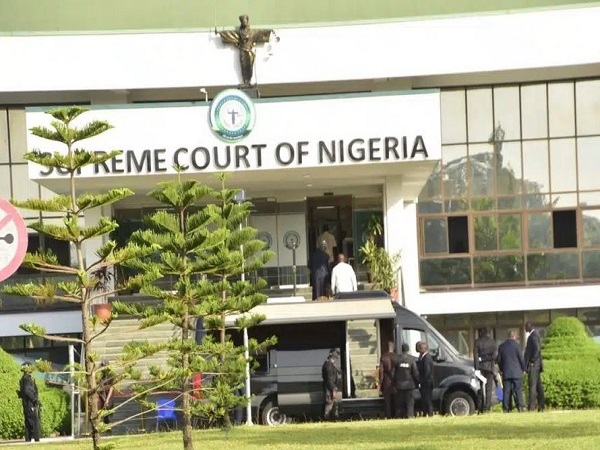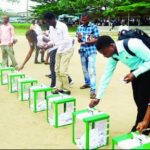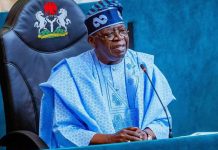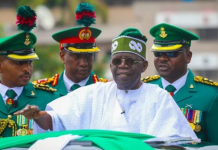I hope Bauchi State Governor Bala Mohammed can finally get some sleep. He deserves it. After the ruling of the Supreme Court on Friday, upholding his election, the governor told a crowd of his supporters who came to rejoice with him at the State Government Lodge in Abuja that he had not slept for seven days in spite of the comfort of his waterbed.
Mohammed, a member of the People’s Democratic Party (PDP), said he had been awake, seven days and seven nights, “fighting former leaders” to secure the mandate of voters.
I can imagine. This was an election that took place nearly one year ago. And yet, the governor, like his colleagues in seven other states or nearly one-quarter of Nigeria’s 36 states, has spent one-quarter of his tenure in court, waiting for what has now become the most important vote of all – the ballot of the court.
If it were in my place to do so, I would have asked the governor what he spent seven days and seven nights doing in Abuja. Was he involved in a nonstop nocturnal spiritual wrestling match with the principalities and powers who wanted to steal his votes?
Was he in strategy sessions with ecclesiastical hosts? Was he combining these with visits to some renowned marabouts who may have been obliged to camp outside the Supreme Court as part of the ritual of success?
If it were in my place, I would have asked what exactly he was doing in Abuja, the domain of their Lordships, without sleeping for seven days and seven nights.
Thanks offering
From what Mohammed said, however, it was not only the court that deserved the credit for the favourable outcome of the matter. Two of the other seven governors specifically thanked President Bola Ahmed Tinubu and his deputy, Kashim Shettima, for their non-interference. According to the Bauchi State governor, some people had gone to tell the president that he was a threat to him.
“I’m grateful to the government of President Tinubu,” Mohammed said, “who believes in good governance – for allowing the rule of law to persist irrespective of lies and mischievous acts that have been perpetrated against me.”
If the governor commended his legal team at all, that part might have been omitted in the statement published in the press, which contained nothing but heartfelt praise for the Supreme Court and the president for not beating the justices.
We die here
Another point of interest was the physical presence of five of the eight governors at the Supreme Court when the judgment was delivered. Of course, they all have a right to be there, to receive firsthand the much-expected good news after days, weeks, and perhaps even months of tension. Who wouldn’t?
There was once a time, though, when the drama, the intensity, the sheer uncertainty, and especially the fearsome reputation of the court in matters like these would have kept the main parties far away from the precincts of the court.
There was an exception, of course. In 1983, the federal election body, FEDECO (as it was then called), declared that Bola Ige of the Unity Party of Nigeria (UPN), who had just completed his first term as governor, had lost his reelection to Omololu Olunloyo of the National Party of Nigeria (NPN).
Ige petitioned the election tribunal and was in court as part of the UPN’s legal team, though not as the lead counsel. Not even during the equally bitter 1979 contest between the UPN and the NPN after the controversial presidential election did either Obafemi Awolowo or Shehu Shagari appear in court, though at an earlier stage, Awolowo appeared at the tribunal in Ikoyi in his famous suit.
One crooked step
Of course, that dispensation was different. The Electoral Act mandated the disposal of election cases before swearing-in. But the law is just as good as those who make them and those who are supposed to implement them. Some aspects of the election law have improved in the last 24 years. In spite of the improvements, however, politicians, with plenty of help from lawyers, have also found a way to stay one crooked step ahead. And perhaps one of the most perverse outcomes of all of this is that there’s hardly any solid, reliable set of electoral jurisprudence.
Jurisprudential jiggery-pokery has a very long history in Nigeria, even though it wasn’t always rampant or brazen. It was with a heavy, tormented heart, for example, that Justice Fatai Atanda-Williams said the judgment of the Supreme Court in the famous case of Awolowo v Shagari in 1979 was never to be cited as precedent.
Today, the Supreme Court has made so many conflicting and confusing judgments that even if it were to make exemptions, it would find itself too entangled in the knot of its own self-inflicted misery to know where or how to start.
How can the court which, four years ago, sacked the entire government in Zamfara in an election in which the winner, Mukhtar Shehu Idris, won 67.41 per cent of the votes on the grounds that the APC failed to conduct valid primaries (clearly a party matter), now give judgments, like that in Plateau State for example, that suggest that it is alright for courts to meddle in party pre-election matters?
Or how can the same Supreme Court, which affirmed the ruling of the tribunal and the Court of Appeal that the PDP had no business dabbling into whether Vice-President Shettima had been doubly nominated by the APC because it was that party’s internal affair, reject the decisions of the lower courts that Senator Ahmed Lawan who didn’t participate in the party’s primary was the validly nominated candidate of the same party?
And how, for sanity’s sake, did the Supreme Court, which set aside the ruling of the Court of Appeal that Senator Godswill Akpabio was not the validly nominated candidate of the APC for Akwa-Ibom North-West senatorial seat because it was a party affair, justify plunging into the arena of internal party politics and pre-election matters in Zamfara and Plateau?
Thank the king?
It’s not too hard to see why politicians prefer to camp outside the court or to thank the president when cases favour them. They think that if, with the help of senior lawyers, you can purchase the courts and be in the president’s good books, your problems are nearly solved, regardless of what happened at the ballot.
I’m still trying to figure out a situation where a politician in the UK, the US, or even in Ghana or South Africa wins a case in court and immediately grants a press conference afterwards thanking the king, president or prime minister for not interfering. This must be a uniquely Nigerian contribution to jurisprudential courtesies.
Some progress has been made in our elections, no doubt.
Yet, if the point of elections is to make the voter’s ballot count and also give all parties a fair chance of settling any disputes that may arise, two things need to happen immediately: we must return to the era where all election petitions are disposed of before swearing in, and limit all disputes to not more than two layers of adjudication.
The regrettable, perhaps unintended overall effect of last Friday’s ruling is that it may have further undermined the judiciary as a whole, but particularly, thrown the Court of Appeal under the bus, which has had, I’m told, only five per cent of its cases overturned in the last two election cycles. That, quite frankly, is not only a sad but frightening thing. It is a trend capable of keeping the whole country awake at night.











